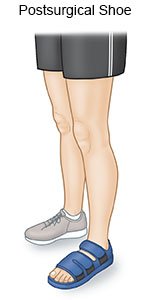Toe Amputation
Medically reviewed by Drugs.com. Last updated on Apr 6, 2025.
AMBULATORY CARE:
What you need to know about toe amputation:
Toe amputation is surgery to remove all or part of your toe.
How to prepare for toe amputation:
Your surgeon will talk to you about how to prepare for surgery. He or she may tell you not to eat or drink anything after midnight on the day of your surgery. He or she will tell you what medicines to take or not take on the day of your surgery. Arrange for someone to drive you home and stay with you after surgery.
What will happen during toe amputation:
You may be given anesthesia to numb your leg or foot. You may feel pressure or pushing during surgery, but you should not feel any pain. Your surgeon will make an incision near your toe. He or she will remove all or part of your toe. Your incision will be closed with stitches. A thick, soft bandage will be placed over your foot.
What will happen after toe amputation:
You will be taken to a room to rest until you are fully awake. Healthcare providers will monitor you closely for any problems. When your healthcare provider sees that you are okay, you will be sent home. You may need to wear a medical shoe or boot for a time after surgery.
 |
Risks of toe amputation:
- You may bleed more than expected or develop an infection. You may feel pain, itching, or numbness where your toe was. Your scar may be painful after it heals. Your other toes could curl inward or look crooked. Your other toes may move into the space created by your missing toe.
- Your wound may not heal properly. This may lead to another amputation. Infection or poor blood flow during surgery could damage the tissue in your other toes. You may get a blood clot in your leg. This may become life-threatening.
Call your doctor if:
- You have severe pain.
- Blood soaks through your bandage.
- Your stitches come apart.
- You see a rash, blister, or sore on your wound.
- You have a fever or chills.
- Your wound is red, swollen, or draining pus.
- Your wound is bleeding.
- You have pain that does not go away even after you take pain medicine.
- You have questions or concerns about your condition or care.
Medicines:
You may need any of the following:
- Prescription pain medicine may be given. Ask your healthcare provider how to take this medicine safely. Some prescription pain medicines contain acetaminophen. Do not take other medicines that contain acetaminophen without talking to your healthcare provider. Too much acetaminophen may cause liver damage. Prescription pain medicine may cause constipation. Ask your healthcare provider how to prevent or treat constipation.
- Take your medicine as directed. Contact your healthcare provider if you think your medicine is not helping or if you have side effects. Tell your provider if you are allergic to any medicine. Keep a list of the medicines, vitamins, and herbs you take. Include the amounts, and when and why you take them. Bring the list or the pill bottles to follow-up visits. Carry your medicine list with you in case of an emergency.
Care for your wound as directed:
You may need to keep your wound dry until your stitches are removed. You may be told to carefully wash the wound with soap and water. Dry the area and put on new, clean bandages as directed. Change your bandages when they get wet or dirty. Check your incision area as directed. Look for signs of infection such as redness, swelling, or drainage.
Use assistive devices as directed:
- Use a cane, crutches, or a walker as directed. These devices will decrease or keep the weight off your foot while it heals.
- Use orthotics, prosthetics, or medical shoes as directed. For example, orthotics or custom inserts can help keep the pressure on your foot even. A foam spacer may also be used in place of your missing toe. Medical shoes such as those with a rocker sole also take pressure off your toes. These help you walk with comfort.
Follow up with your surgeon as directed:
You will need to return to have your stitches removed in 7 to 10 days or as directed. Write down your questions so you remember to ask them during your visits.
© Copyright Merative 2025 Information is for End User's use only and may not be sold, redistributed or otherwise used for commercial purposes.
The above information is an educational aid only. It is not intended as medical advice for individual conditions or treatments. Talk to your doctor, nurse or pharmacist before following any medical regimen to see if it is safe and effective for you.
Further information
Always consult your healthcare provider to ensure the information displayed on this page applies to your personal circumstances.
